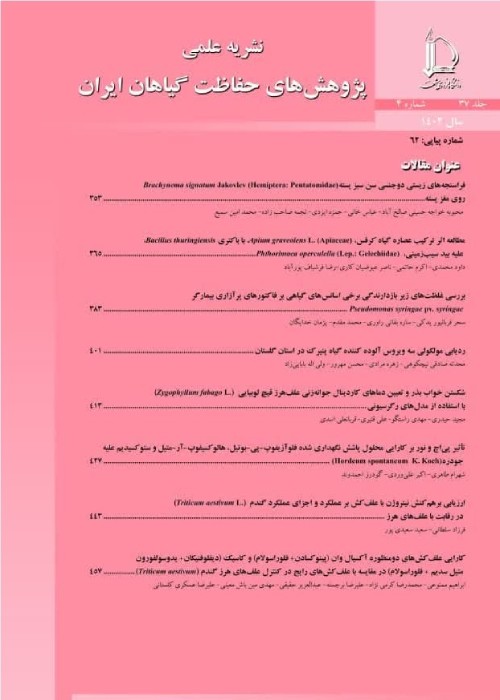Optimizing the Performance of Bentazon+Acifluorfen and Imazethapyr on Chenopodium album L. (Common Lambsquarter) Control by Adjuvants
Author(s):
Article Type:
Research/Original Article (دارای رتبه معتبر)
Abstract:
Introduction
Weed management is one of the most important aspects of successful crop production for supplying food for the rising population. Chenopodium album L. (common lambsquarter) is among the most noxious weeds in the world due to its superior biology and tremendous ecological adaptations. It causes substantial yield losses in different field crops including potato, tomato, soybean, alfalfa, watermelon, sugar beet, and so on. Therefore, management of C. album L. is crucial for optimum crop production. Chemical management is a very relevant method for controlling C. album. For decreasing costs of production, adverse and edge effects of the herbicide, optimizing herbicides performance is very essential. It seems that the use of adjuvants is the best solution method to achieve optimizing herbicides performance. Using a proper adjuvant may be affected the performance and fate of herbicide in the environment and finally may be restrict introduced to the food chain. Therefore, using proper adjuvants known as a key point in adjuvants applying technology. This study was conducted for evaluating adjuvants effects on C. album control by Bentazon+Acifluorfen and Imazethapyr herbicides.
Materials and Methods
In order to study the effects of adjuvants on the performance of Bentazon+Acifluorfen and Imazethapyr on C. album control two separated experiments as factorial based on completely randomized design were conducted in the research greenhouse of Faculty of Agriculture, University of Birjand in 2016. Treatments included herbicide concentration at seven levels (0, 6.25, 12.5, 25, 50, 75 and 100 % of recommended dose) and adjuvant at three levels (turnip oil, citogate and without adjuvants) with four replications. For increasing seed germination and breaking seed dormancy of C. album, the seeds treated by sulfuric acid for 1 min, and then seeds washed with tap water for 10 min. Then the seeds were sown in potting trays (3 cm × 3 cm × 5 cm) filled with moistened peat. One week after sowing, at the one-leaf seedlings stages, they were transplanted to 2-L plastic pots filled with a mixture of sand, clay loam soil, and peat (1:1:1; v/v/v). The pots were sub-irrigated every two days. The seedlings were thinned to four per pot at the two-leaf stage. The spray was done at the four-leaf stage (Four weeks after sowing) by using a chargeable sprayer equipped with an 8002 flat fan nozzle tip delivering 250 L ha-1 at 2 bar spray pressure. Four weeks after spraying, the above ground tissue and roots of plant were harvested, oven dried and weighted.
Results and Discussion
The results of these experiments showed that the use of additives, especially turnip oil, increased the efficacy of Bentazon+Acifluorfen and Imazethapyr herbicides in control of C. album. Turnip oil and citogate increased the efficiency of Bentazon+Acifluorfen and Imazethapyr in reducing the production of by C. album above ground tissue1.29, 1.28, 2.13, and 1.30 times, respectively. However, these values were equal to 2.79, 1.98, 2.35, and 1.66 times for reducing the root biomass of C. album. The results of this study also showed that the root was more susceptible to herbicides in the presence of adjuvants. Increasing Bentazon+Acifluorfen and Imazethapyr herbicides concentrations led to decreased dry biomass produced by C. album. Turnip oil compared to citogate showed high efficiency for improving Bentazon+Acifluorfen and Imazethapyr performance. The results of this study showed a similar trend with other scientific reports including Rashed mohassel et al (26) that reported the high efficiency of herbicides for controlling canary grass (Phalaris minor Retz.) in the presence of vegetable oils compared with mineral oils.
Conclusion
The result of this study showed different response of Bentazon+Acifluorfen and Imazethapyr to turnip oil and Citogate adjuvants. Therefore, applied proper herbicide adjuvant is a key factor in chemical weed management because this factor reduces herbicide rates for similar weed response. Using proper adjuvants may be increased herbicide performance more than other adjuvants. Moreover, results of these experiments revealed that root response was more than above ground tissue response to Bentazon+Acifluorfen and Imazethapyr herbicides in the presence of adjuvants.Keywords:
Language:
Persian
Published:
Journal of plant protection, Volume:33 Issue: 1, 2019
Pages:
99 to 110
magiran.com/p2000580
دانلود و مطالعه متن این مقاله با یکی از روشهای زیر امکان پذیر است:
اشتراک شخصی
با عضویت و پرداخت آنلاین حق اشتراک یکساله به مبلغ 1,390,000ريال میتوانید 70 عنوان مطلب دانلود کنید!
اشتراک سازمانی
به کتابخانه دانشگاه یا محل کار خود پیشنهاد کنید تا اشتراک سازمانی این پایگاه را برای دسترسی نامحدود همه کاربران به متن مطالب تهیه نمایند!
توجه!
- حق عضویت دریافتی صرف حمایت از نشریات عضو و نگهداری، تکمیل و توسعه مگیران میشود.
- پرداخت حق اشتراک و دانلود مقالات اجازه بازنشر آن در سایر رسانههای چاپی و دیجیتال را به کاربر نمیدهد.
دسترسی سراسری کاربران دانشگاه پیام نور!
اعضای هیئت علمی و دانشجویان دانشگاه پیام نور در سراسر کشور، در صورت ثبت نام با ایمیل دانشگاهی، تا پایان فروردین ماه 1403 به مقالات سایت دسترسی خواهند داشت!
In order to view content subscription is required
Personal subscription
Subscribe magiran.com for 70 € euros via PayPal and download 70 articles during a year.
Organization subscription
Please contact us to subscribe your university or library for unlimited access!



